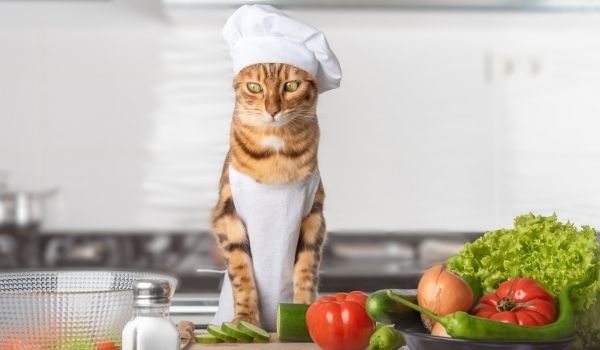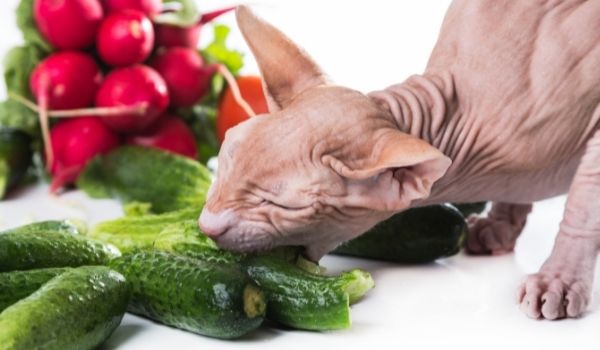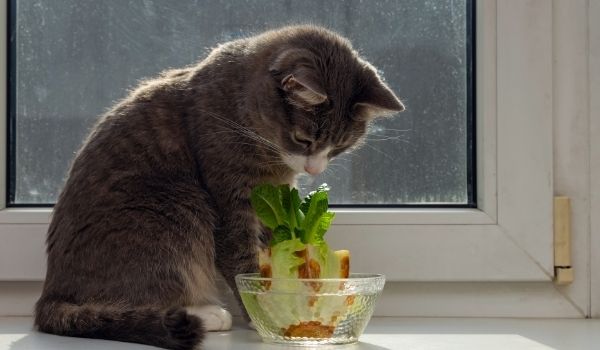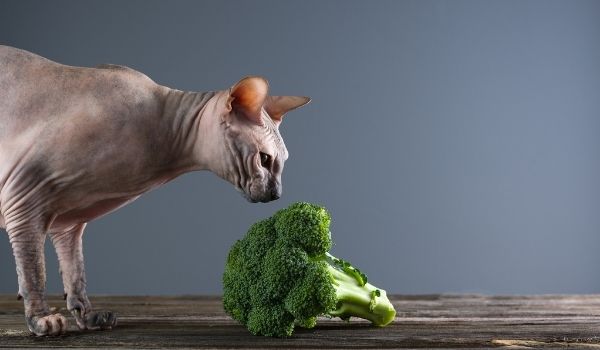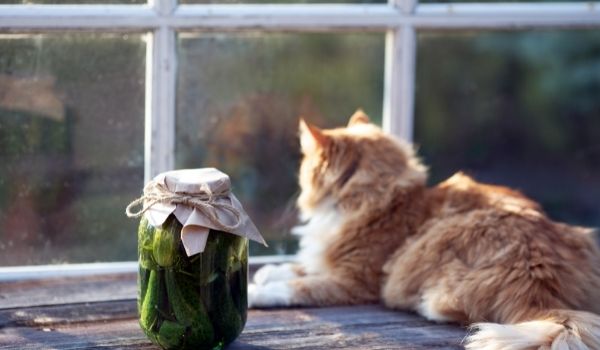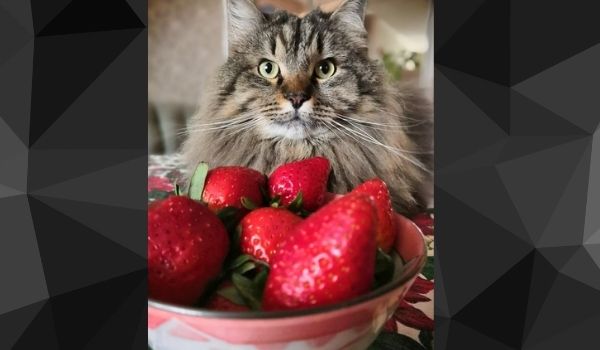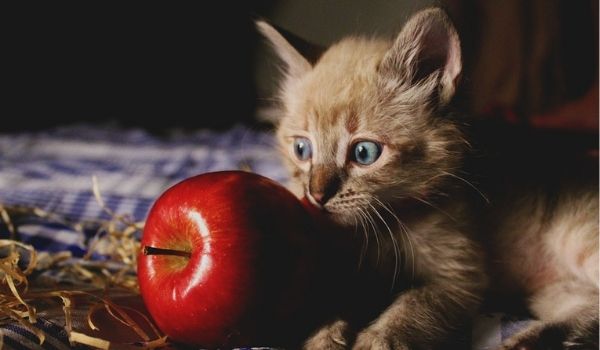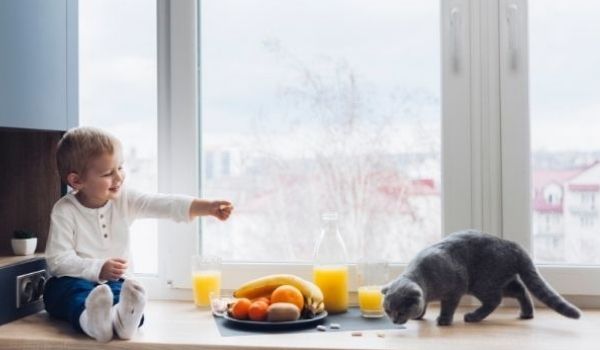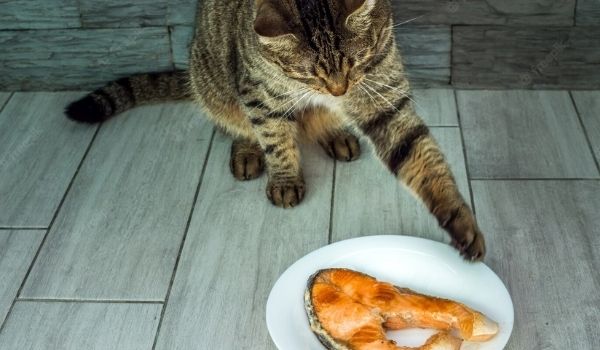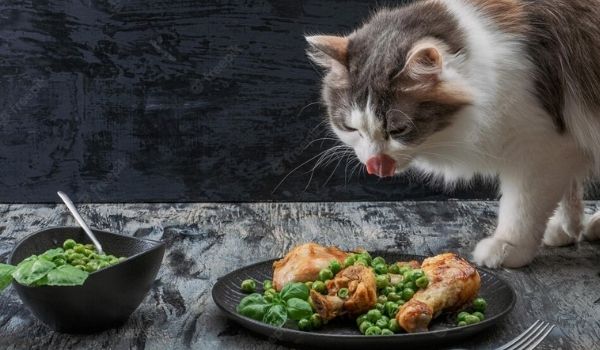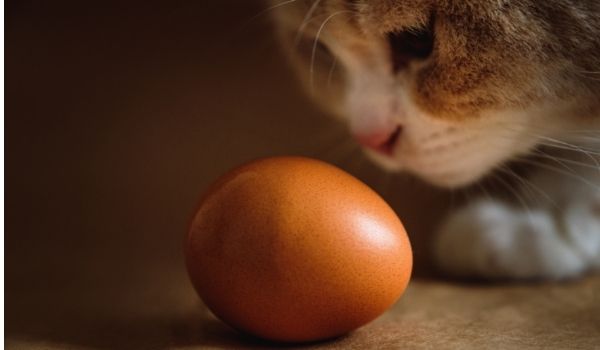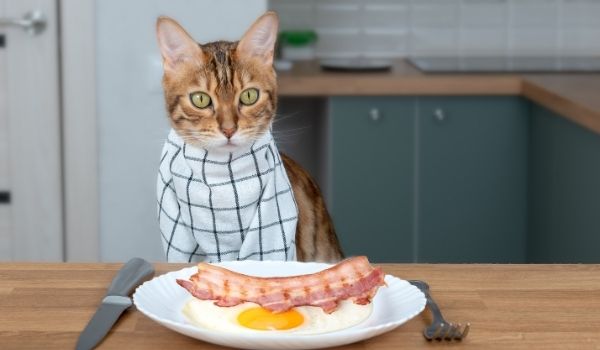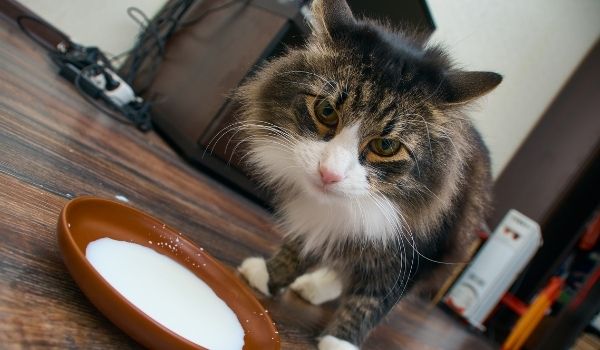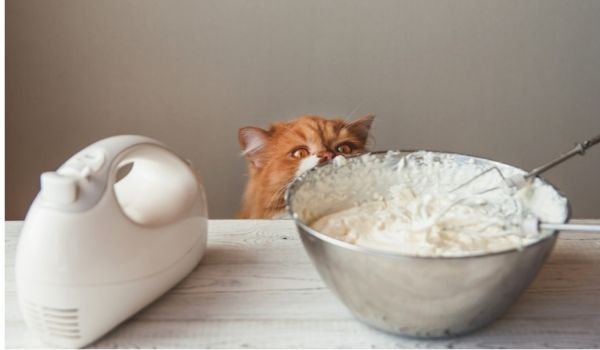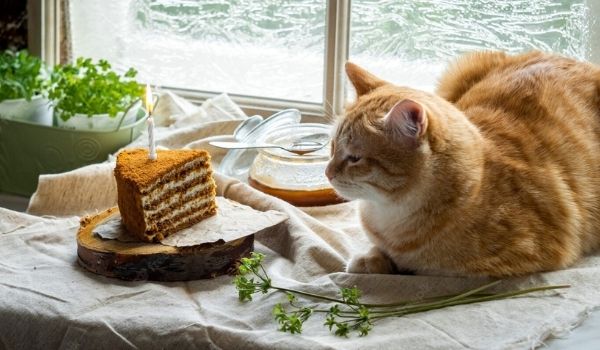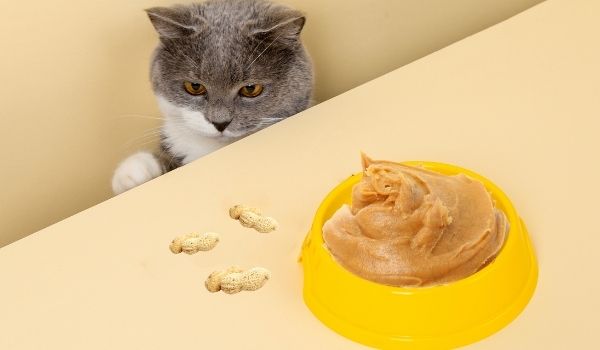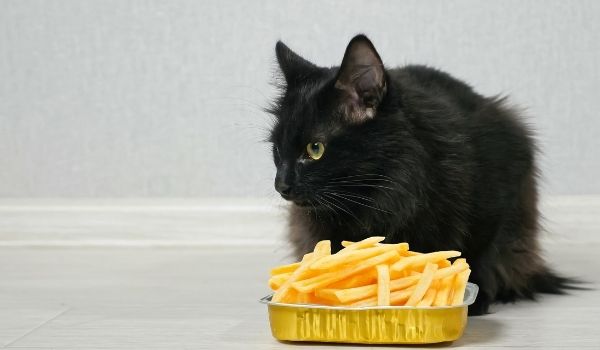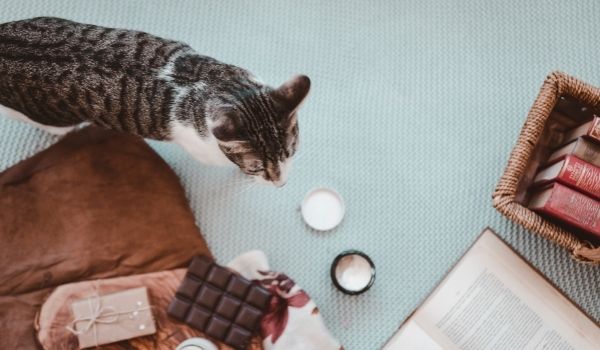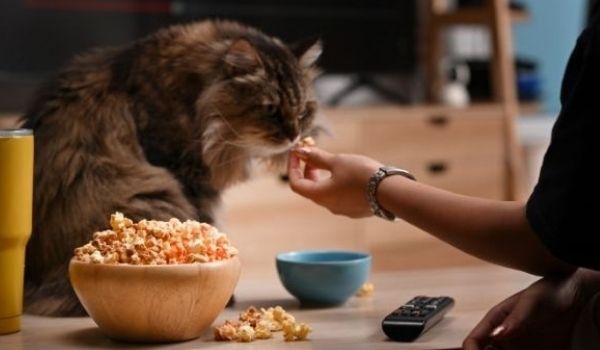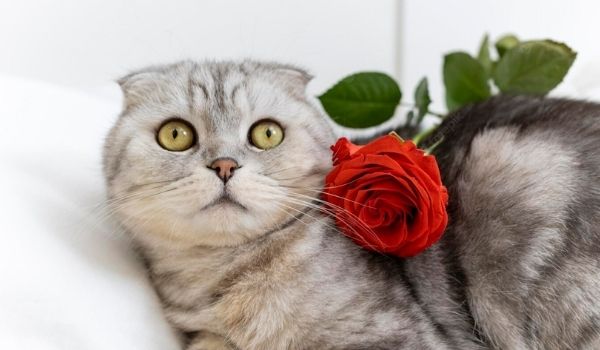We love our cats. We share everything with them—our homes, love, deep dark secrets, personal space, and whatnot. That’s not enough for these spoilt little insatiable creatures. They want us to share our plates with them as well—they want a taste of everything that we are having. We also want to share the taste of our favorite foods with our feline friends, but we are stopped by the thought: can cats eat human foods? What human foods can cats eat? And what human foods cats should not eat?
What Human Foods Can Cats Eat?
When our cats see us eating, they start meowing, begging, and pleading for whatever it is that we are having. While not all human foods are safe for cats to eat, below, we have discussed some human foods safe for cats to eat.
Can Cats Eat Vegetables?
While cats are obligate carnivores and don’t require veggies in their diet, fresh veggies like cucumbers, lettuce, spinach, etc., can make a safe and healthy snack for cats. Veggies contain useful vitamins, minerals, and fibers that are healthy for cats. That said, veggies like onions and garlic are toxic to cats.
So before you get swayed by your cat’s big kitty eyes and innocent meows and slip her a piece of the veggie you are cutting or eating, you should first make sure that it is safe for them to eat.
Below we have discussed several cat-safe vegetables that you can go ahead and share with your cat.
1. Cucumbers: Can Cats Eat Cucumbers?
Low in calories, brimming with water, high in antioxidants and vitamins (C and K), and minerals (like magnesium), cucumbers are safe and healthy for cats to eat occasionally in small amounts. But eating in excess would upset their stomach leading to diarrhea.
2. Spinach: Can Cats Eat Spinach?
Yes, cats can eat spinach. It is rich in iron, making it a great snack for cats suffering from iron deficiency anemia. Spinach is also loaded with dietary fibers that help cats with bowel movement and relieve them of constipation. However, if your cat has a history of urinary tract infections and bladder stones, spinach would be a big no-no for her.
3. Lettuce: Can Cats Eat Lettuce?
Yes, cats can eat lettuce. Besides hydrating, lettuce help boost cats’ immunity by providing them antioxidants. Dietary fibers in lettuce also help improve the overall gastrointestinal health of cats and prevent constipation. That said, eating lettuce in excess might make your furball experience diarrhea.
4. Mushrooms: Can Cats Eat Mushrooms?
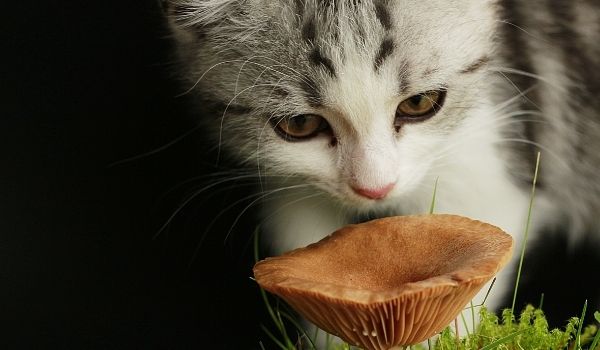
Store-bought Mushrooms – yes. Wild mushrooms – NO!
Loaded with amino acids and featuring umami flavor, mushrooms make an irresistible and healthy snack for cats. While around 99% of the mushrooms are perfectly safe for cats to eat, 1% that include wild mushrooms like Amanita (death cap) can be deadly for cats.
5. Rosemary: Is Rosemary Safe for Cats?
Rosemary is perfectly safe for cats with many medicinal benefits. Antioxidants—carnosic acid and rosmanol—in rosemary protects cats’ brain from oxidative free radical damage and help them fight cancer. Besides, rosemary has a decent amount of vitamin A, vitamin C, and dietary fibers that are healthy for cats.
Eating rosemary in excess or consuming concentrated rosemary oil can upset a cat’s stomach and plunge her into depression.
6. Broccoli: Can Cats Eat Broccoli?
Laden with useful vitamins, minerals, and antioxidants, broccoli is completely safe and healthy for cats, as long as it is being consumed in moderate amounts. In case of excessive consumption, the cat may experience tummy aches. You can steam broccoli to make it easier for cats to digest, but don’t add any seasonings.
7. Carrots: Can Cats Eat Carrots?
Treasured with super antioxidant—beta carotene—carrots make a healthy snack for cats. Carrots also have to offer useful vitamins and minerals such as vitamin K and E, potassium, magnesium, zinc, fibers, etc. However, given that raw carrots are pretty hard, they pose a choking hazard to cats. So cooked carrots lacking any kind of seasoning and topping would be a perfect treat for your cat.
8. Cinnamon: Can Cats Eat Cinnamon?
No! Cats shouldn’t eat cinnamon.
While it is not classified as toxic to cats, it can be detrimental to their health at certain levels—when consumed in concentrated form or the cat has a sensitive stomach. Cinnamon is known as a good source of antioxidants and for boosting sensitivity to insulin, but given the risk of cinnamon toxicity, you should not give cinnamon to your cat.
9. Pickles: Can Cats Eat Pickles?
Cats shouldn’t eat pickles.
While pickles are not toxic to cats, they are detrimental to cats’ health. Where the high salt content in pickles can cause salt poisoning in cats, garlic and onion seasonings can cause life-threatening problems in cats like anemia, blood in urine, and increased heartbeat.
Feeding Veggies to Cats!
Cats are obligate carnivores—their digestive system is designed to digest meaty proteins and not veggies. Therefore, even the cat-safe vegetables should only be shared with cats occasionally in small amounts as a treat.
Can Cats Eat Fruits?
Absolutely! Peeled, with seeds removed and finely chopped, cats can eat a variety of fruits occasionally as a treat. However, the too much sugar that fruits have to offer can upset cats’ stomachs and lead to diabetic issues and weight problems. Therefore, it is strongly advised that fruits and other treats never exceed 2% of their routine diet.
Cats are sweet-blind—they lack the sweet tooth—so don’t be surprised if your cat turns her nose up at fruits.
Below we have discussed some of the fruit that your kitty can safely eat.
10. Strawberry: Can Cats Eat Strawberries?
Yes, cats can eat strawberries in small amounts. Though strawberries are brimming with useful vitamins and minerals, our cats cannot reap any considerable health benefits like humans, as they cannot safely consume them in large amounts. Besides, cats cannot perceive the heavenly sweet taste of strawberries. So you’d best limit it.
11. Mango: Can Cats Eat Mangoes?
Low in calories, mango can be a great hydrating treat for cats in summers. Besides juiciness, mangoes are rich in fibers and vitamins (A, B6, C, E, K), folates, and many other useful minerals. However, you should peel the mango, remove the pit and chop it into small cubes or slices before offering your cat, and as with other treats, be moderate.
12. Watermelon: Can Cats Eat Watermelon?
Absolutely! Around 92% water, watermelon flesh make a safe and hydrating snack for cats on sweltering summer days. It also contains lots of fibers, useful minerals and vitamins, and antioxidants. However, never give watermelon seeds and rind to cats, as they pose a choking hazard. Besides, seeds contain cyanide as well, an ingredient harmful to cats.
13. Apples: Can Cats Eat Apples?
Yes, cats can eat apples. Before giving apples to your cat, you should thoroughly wash them, dice them into small pieces, and remove seeds. Like watermelon seeds, apple seeds also contain cyanide. While apple peel won’t harm your cat, seeds and stems should be avoided.
14. Banana: Can Cats Eat Bananas?
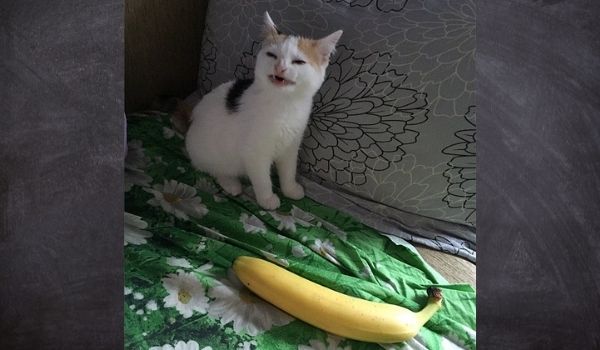
Yes, cats can eat bananas sparingly as a treat. Though bananas have to offer many useful nutrients and minerals to cats, they are high in carbohydrates, which cats don’t essentially need. Therefore, you should not offer more than one or two small pieces of banana to your cat.
15. Oranges: Can Cats Eat Oranges?
No! Cats cannot eat oranges. Like all citrus fruits, oranges are toxic to cats. Essential oils and psoralens present in oranges pose the risk of citrus poisoning in cats. Where essential oils will upset your cat’s stomach and lead to nervous system depression, psoralens cause photosensitivity in cats.
16. Avocado: Can Cats Eat Avocado?
Yes, cats can eat avocado flesh. Containing a decent amount of proteins, healthy fats, dietary fibers, useful vitamins, and antioxidants, avocado is considered a superfood for cats. Many experts are advising adding avocados to the cat diet. That said, avocado pit and peel contain the toxin persin, which is harmful to cats.
17. Pistachios: Can Cats Eat Pistachios?
No, cats shouldn’t eat pistachio.
Pistachios are not toxic to cats, but they are laden with fibers and fats. Though cats need a certain amount of fibers and fats in their diet, their high content leads to loose stool and increased risk of obesity, respectively. Besides, there is the risk of salt poisoning and choking hazard. Therefore, it is best that you don’t offer pistachios to your cat.
Meat and Dairy
18. Fish: Can Cats Eat Fish?
Yes, cats can eat fish if they are not allergic.
Cooked fish, free of seasonings, would be a healthy source of proteins for your cat, as long it is being fed in moderate amounts. Making fish an integral part of your cat diet would lead to mercury poisoning. Moreover, by eating raw fish, your cat may develop thiamine deficiency, which could be life-threatening.
19. Chicken: Can Cats Eat Chicken?
Yes, cats can eat chicken, thoroughly cooked, plain, and simple.
Cats are obligate carnivores, requiring animal proteins to stay fit and healthy. High in lean proteins and low in sodium and fats, chicken breast would make a perfect treat for your cat. But you should make sure that the chicken is thoroughly cooked and plain—free of seasonings.
20. Eggs: Can Cats Eat Eggs?
Raw eggs – No! Cooked eggs – yes!
Boiled and scrambled eggs, free of salts or any other seasonings, make a good source of animal proteins for cats but be wary of fat content. Egg yolks contain a comparatively high amount of fats, so it is best to offer only egg whites to your cat. Excessive consumption of fatty content can lead to gastrointestinal health issues and pancreatitis in cats.
21. Bacon: Can Cats Eat Bacon?
Cats can eat bacon, but they really shouldn’t.
Cats are obligate carnivores—eating meaty proteins is their thing. However, most vets advise that cats shouldn’t eat bacon. It is loaded with salts and fats, putting cats at the risk of salt poisoning and obesity.
22. Hot Dogs: Can Cats Eat Hot Dogs?
It may sound counterintuitive as cats are obligate carnivores, but the processed meat used in the making of hot dogs is far from natural meat. Besides, hot dogs are packed with unhealthy fats, contain too much sodium, and have added preservatives and flavorings.
23. Milk: Can Cats Drink Milk?
Though milk and cats seem like a perfect combination, cats shouldn’t drink milk. Most cats are lactose intolerant and lack the enzyme (lactase) required for the digestion of lactose sugar in milk. Besides, milk contains too much fat, increasing the risk of obesity in cats.
24. Almond Milk: Can Cats Drink Almond Milk?
Yes, cats can drink almond milk but only in moderation.
Almond milk contains no lactose, so your lactose intolerant kitty won’t have any trouble digesting it. That said, you should not give leftover cereal milk or flavored almond milk to your cat. In addition, watch out for xylitol (it’s toxic to cats) in store-bought almond milk.
25. Whipped Cream: Can Cats Have Whipped Cream?
No, cats shouldn’t have whipped cream.
Besides the fact that whipped cream contains dairy and most cats are lactose intolerant, it is loaded with sugar and contains vanilla extract, which can cause alcohol poisoning in cats. The store-bought cream may also contain xylitol, which poses the risk of xylitol poisoning in cats.
Some Other Human Foods for Cats
26. Honey: Can Cats Eat Honey?
Though honey is not toxic to cats, it is brimming with fructose and glucose sugars, which our cats cannot digest. So eating honey would upset cats’ stomachs and cause a spike in the blood sugar, and can even lead to life-threatening diabetics. Besides, cats, especially kittens, are at risk of picking up botulism.
27. Peanut Butter: Can Cats Eat Peanut Butter?
Yes, but cats shouldn’t eat peanut butter.
Peanut butter isn’t toxic to cats, but it does not offer any nutritional value to felines. That said, it is safe to offer it to your cat in small amounts as a treat. Also, you could mix it with medicine and give it to your cat—if your cat resists taking medicines.
28. Potato Chips: Can Cats Eat Potato Chips?
Yes, but cats shouldn’t eat potato chips.
Potato chips are devoid of essential nutrients required by cats and are too high in carbs and fats, which can upset cats’ stomachs and lead to obesity, diabetes, and heart issues in the long run. Potato chips also contain too much salt, which can lead to sodium poisoning in cats.
29. French Fries: Can Cats Eat French Fries?
No, cats shouldn’t eat French fries.
While French fries are not listed as a toxic food item, they are no good for cats. They are high in carbohydrates, saturated fats, and salts. Easting French dries would upset cats’ stomachs and may also lead to sodium poisoning in cats.
30. Chocolate: Can Cats Eat Chocolate?
Not! Chocolate is toxic to cats.
All chocolates containing toxic agents, caffeine and theobromine, are toxic to cats and can cause seizures, tremors, coma, and even death in cats.
As a rule of thumb, the darker the color of chocolate, the greater the toxicity. This means that baking chocolate and dark chocolate are the most toxic and white chocolate the least.
31. Popcorns: Can Cats Eat Popcorns?
Yes, cats can eat popcorns, plain and freshly popped, in moderate amounts. Eating in excess may cause gastrointestinal health issues in cats. Toppings like butter, salt, garlic, and cinnamon are unhealthy for cats, and therefore, you should never offer flavored popcorns to your cat. You should also be wary of the choking hazard posed by popcorns.
32. Roses: Are Roses Toxic to Cats?
Roses are not toxic to cats, but consuming in excess may upset your cat’s stomach. Beyond stomach upset, thorns may seriously damage your kitty’s face, paws, and internals (if ingested). That said, many roses like Christmas rose, moss rose, rosebay, desert rose, primrose, etc., are toxic to cats.
33. Spiders: Can Cats Eat Spider?
Yes, cats can eat spiders, as long as they are not toxic. Most house spiders and those that are safe for humans to eat are harmless for cats as well. However, poisonous spiders like the Black Widow, Brown Recluse, Hobo Spider, etc., can cause serious illness and even death in cats.
Human Foods That Are Toxic to Cats
| Alcohol | Chocolate |
| Coffee and caffeine | Oranges and other citrus fruits |
| Grapes and Raisins | Macadamia nuts |
| Onions, garlic, chives | Raw meat and fish |
| Xylitol | Raw eggs |
| Salt and salty snacks | Dog food |
| Yeast dough | Human medicines |

